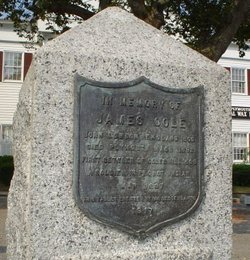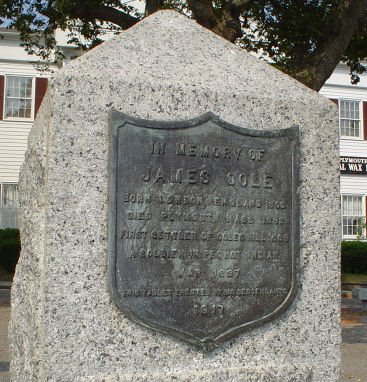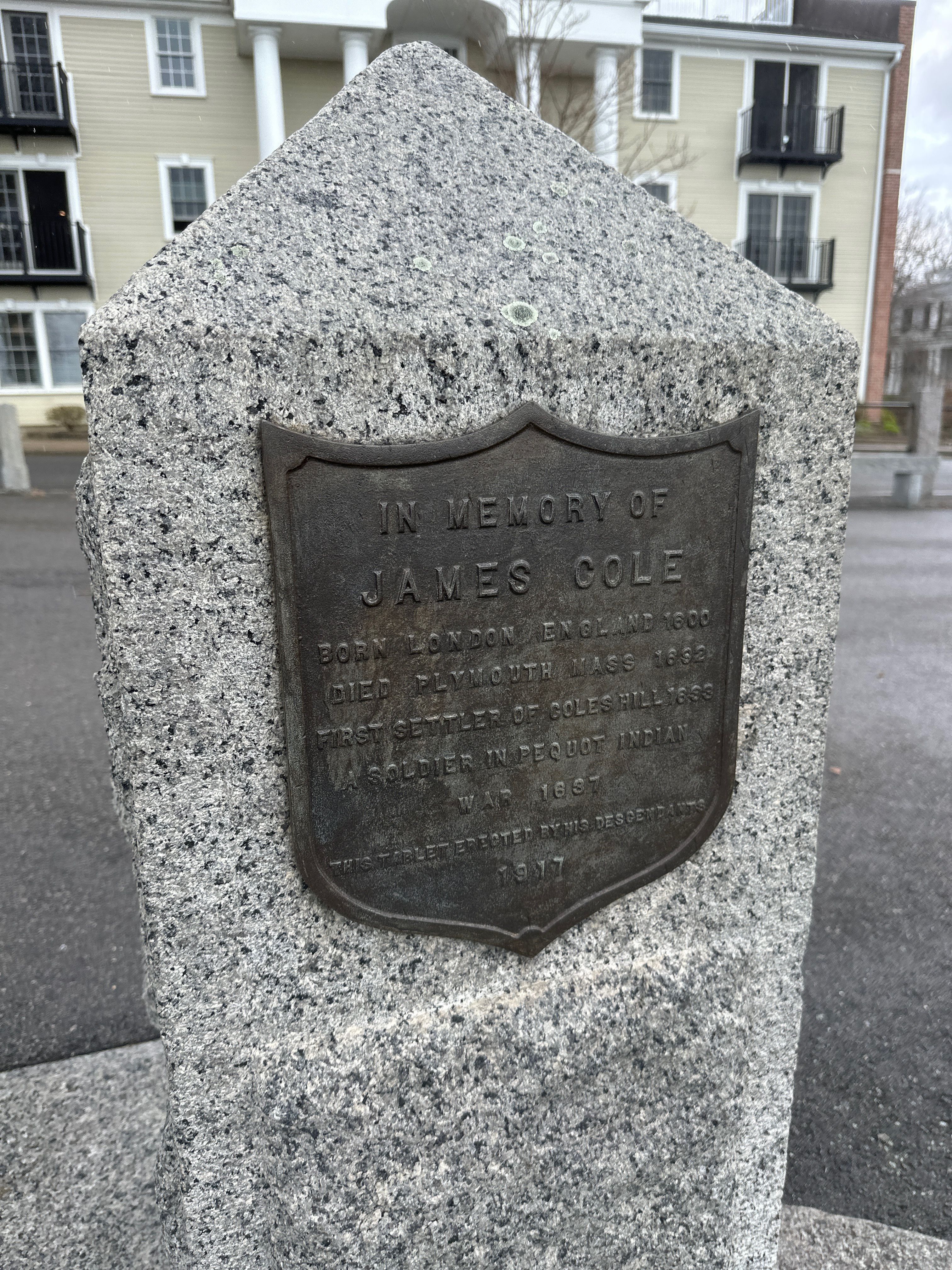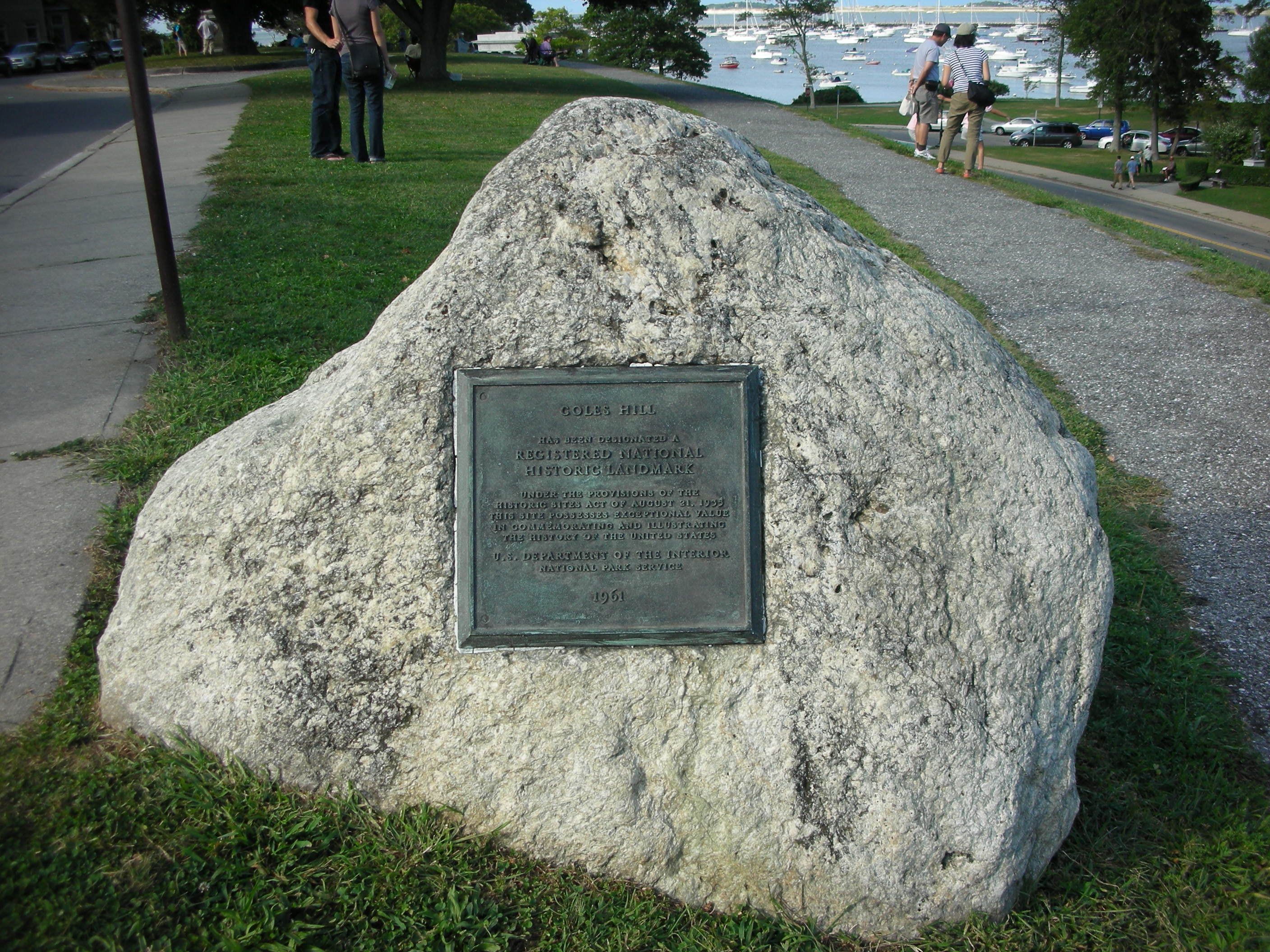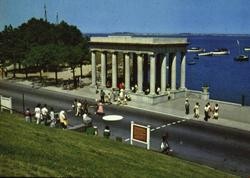Some corrections need to be made in previously accepted histories. "Great Migration states "James Cole of Saco was not part of this family." His parents are not known--and he was not married to Mary Lobel of London. (The granite inscription below was made at a time when this incorrect location of London was thought to be true.)
First settler of Cole Hill. The tablet mounted on the granite post at the top of the steps on Cole's Hill bears this inscription:
"In memory of James Cole
Born London England 1600
Died Plymouth Mass 1692
First settler of Coles Hill 1633
A soldier in Pequot Indian War 1637
This tablet erected by his descendants 1917"
James opened the first tavern and Inn in the Plymouth Colony on a piece of land that is today known as Cole's Hill. It stands in front of Plymouth Rock overlooking the harbor. His lands extended to Swansea Mass. There is a river there named Cole's River. It had formed a property boundary line. Of particular interest is James Cole's apparent lack of church membership among the scores of early prominent settlers whose places of prominence in the community were usually parallelled by leadership roles with in the church. Not only did James Cole appear to avoid church, but also operated a rather rowdy tavern - almost reminiscent of those which gave the old west a notorious flavor.
James Cole became a freeman in Plymouth about 1634. He obtained from the colony a license to operate a public house, and by 1637 his first violation of the liquor control laws was recorded in the court records. A later account describes the throwing of stools and general disturbance until early morning hours. By 1640 the court withdrew James Cole's license to sell liquor, after which he was fined for selling liquor without a license. His license was not restored until 1645.
James continued to operate an inn even without his liquor license. He was apparently financially successful and acted as surety on bonds at various times and loaned money. He undoubtedly won the respect of the towns people. He was elected constable in 1641/2 and again in 1644. He was also appointed highway surveyor several times beginning in 1642.
James Cole, as well as his wife, continued to experience problems in operating the tavern within legal boundaries after his license was restored. James and Mary were fined for allowing drunkenness in the tavern, selling liquor on Sunday, and selling liquor to Indians. In 1652 one of his tavern patrons was up all night drinking in Cole's house before he went out fishing and accidentally drowned.
James himself was cited three times by the court for being drunk, the last time in 1671. In defense of his third offense he claimed to have an infirmity which caused him to appear drunk, and was not fined. He was also charged with battery in 1650, but cleared of the offense.
Despite the rowdy reputation of Cole's tavern, the court in 1653 decided to pay James Cole for his expense of operating an "ordinary," and provided him with "necessaries" for entertaining strangers. In 1659 the court again paid Cole 10 pounds for improvements in his "ordinary."
James Cole also appeared numerous times in court records as either plaintiff or defendant in various actions involving business contracts and debt collections.
In 1670 the operation of the tavern succeeded to James, Jr., who was not charged the excise tax that year because he was beginning a new business. The operation of the tavern went smoothly after James, Jr. took it over, and there were no more fines for license and liquor violations, although one of the patrons was charged with "drinking, gameing and uncivil revelling" in 1671 when he brought a mare into Cole's parlor. Although James, Jr. was not held responsible he was cautioned to "keep good order in his house . . . " with "no revelling there."
He was known as a sailor. Granted 4 acres on 2 Jan 1636/1637, and 50 acre grant on 16 Sep 1641. He kept an inn from 1638 to 1660.
Notes: He appeared frequently in Plymouth Court, sometimes for rather colorful reasons; on 2 Jan 1637 he was noted for drinking excessively at Mr. Hopkins; in 1652, Robert Willis spent the night at James Coles drinking before he went out fishing and drowned; in Oct 1653, he was presented for entertaining townsmen in his house." He was also fined repeatedly for "drawing wine without a license" in 16 ... he was fined 5 s. for selling wine to the Indians and allowing several women to drink on Sunday. He earned enough money to loan money to others in the area. In 1670 his son James took over the ordinary. The place apparently quieted down, though in early 1671, Jonathan Sprague was fined for misbehavior which included riding his horse into the parlor. As a more respectable member of society, he served on several juries from 1637 to 1648, as constable 1642 and 1644, and as surveyor of highways 1641, 1542, 1651, and 1652.
Plymouth Colony Book: He was a servant of Thomas Bourne. He was the owner of Cole's Tavern on Cole's Hill in Plymouth.
The Descendants of James Cole of Plymouth by Ernest Byron Cole page 21 says that he was the first settler of and lived upon what is still known as Cole's hill, the first burial ground of the Pilgrims. This land probably included the ground upon which rests Plymouth rock. In Sept. of 1641, he had a grant of 50 acres of land at Lakenham meadow. In Oct 1642, he had a further grant of land at the same place. In 1662 a grant of land at Sacconet Neck. In 1665 he had 30 acres of land on the west side of the Namuet River. He was surveyor of highways in the years 1641,1642,1651,and 1652; was constable in 1641 and 1644. In 1637 his name appears upon a list of volunteers against the Pequot Indians. Soon after his arrival at Plymouth he opened the first inn or public house of Plymouth, and one of if not the first , public house in New England. This house was kept as a public house by him and his son James until 1698. In 1668 he sold to his son James the land down to and including the lot upon which stands the Baptist Church. In 1689 his son James sold it to William Shurtliffe.
Some corrections need to be made in previously accepted histories. "Great Migration states "James Cole of Saco was not part of this family." His parents are not known--and he was not married to Mary Lobel of London. (The granite inscription below was made at a time when this incorrect location of London was thought to be true.)
First settler of Cole Hill. The tablet mounted on the granite post at the top of the steps on Cole's Hill bears this inscription:
"In memory of James Cole
Born London England 1600
Died Plymouth Mass 1692
First settler of Coles Hill 1633
A soldier in Pequot Indian War 1637
This tablet erected by his descendants 1917"
James opened the first tavern and Inn in the Plymouth Colony on a piece of land that is today known as Cole's Hill. It stands in front of Plymouth Rock overlooking the harbor. His lands extended to Swansea Mass. There is a river there named Cole's River. It had formed a property boundary line. Of particular interest is James Cole's apparent lack of church membership among the scores of early prominent settlers whose places of prominence in the community were usually parallelled by leadership roles with in the church. Not only did James Cole appear to avoid church, but also operated a rather rowdy tavern - almost reminiscent of those which gave the old west a notorious flavor.
James Cole became a freeman in Plymouth about 1634. He obtained from the colony a license to operate a public house, and by 1637 his first violation of the liquor control laws was recorded in the court records. A later account describes the throwing of stools and general disturbance until early morning hours. By 1640 the court withdrew James Cole's license to sell liquor, after which he was fined for selling liquor without a license. His license was not restored until 1645.
James continued to operate an inn even without his liquor license. He was apparently financially successful and acted as surety on bonds at various times and loaned money. He undoubtedly won the respect of the towns people. He was elected constable in 1641/2 and again in 1644. He was also appointed highway surveyor several times beginning in 1642.
James Cole, as well as his wife, continued to experience problems in operating the tavern within legal boundaries after his license was restored. James and Mary were fined for allowing drunkenness in the tavern, selling liquor on Sunday, and selling liquor to Indians. In 1652 one of his tavern patrons was up all night drinking in Cole's house before he went out fishing and accidentally drowned.
James himself was cited three times by the court for being drunk, the last time in 1671. In defense of his third offense he claimed to have an infirmity which caused him to appear drunk, and was not fined. He was also charged with battery in 1650, but cleared of the offense.
Despite the rowdy reputation of Cole's tavern, the court in 1653 decided to pay James Cole for his expense of operating an "ordinary," and provided him with "necessaries" for entertaining strangers. In 1659 the court again paid Cole 10 pounds for improvements in his "ordinary."
James Cole also appeared numerous times in court records as either plaintiff or defendant in various actions involving business contracts and debt collections.
In 1670 the operation of the tavern succeeded to James, Jr., who was not charged the excise tax that year because he was beginning a new business. The operation of the tavern went smoothly after James, Jr. took it over, and there were no more fines for license and liquor violations, although one of the patrons was charged with "drinking, gameing and uncivil revelling" in 1671 when he brought a mare into Cole's parlor. Although James, Jr. was not held responsible he was cautioned to "keep good order in his house . . . " with "no revelling there."
He was known as a sailor. Granted 4 acres on 2 Jan 1636/1637, and 50 acre grant on 16 Sep 1641. He kept an inn from 1638 to 1660.
Notes: He appeared frequently in Plymouth Court, sometimes for rather colorful reasons; on 2 Jan 1637 he was noted for drinking excessively at Mr. Hopkins; in 1652, Robert Willis spent the night at James Coles drinking before he went out fishing and drowned; in Oct 1653, he was presented for entertaining townsmen in his house." He was also fined repeatedly for "drawing wine without a license" in 16 ... he was fined 5 s. for selling wine to the Indians and allowing several women to drink on Sunday. He earned enough money to loan money to others in the area. In 1670 his son James took over the ordinary. The place apparently quieted down, though in early 1671, Jonathan Sprague was fined for misbehavior which included riding his horse into the parlor. As a more respectable member of society, he served on several juries from 1637 to 1648, as constable 1642 and 1644, and as surveyor of highways 1641, 1542, 1651, and 1652.
Plymouth Colony Book: He was a servant of Thomas Bourne. He was the owner of Cole's Tavern on Cole's Hill in Plymouth.
The Descendants of James Cole of Plymouth by Ernest Byron Cole page 21 says that he was the first settler of and lived upon what is still known as Cole's hill, the first burial ground of the Pilgrims. This land probably included the ground upon which rests Plymouth rock. In Sept. of 1641, he had a grant of 50 acres of land at Lakenham meadow. In Oct 1642, he had a further grant of land at the same place. In 1662 a grant of land at Sacconet Neck. In 1665 he had 30 acres of land on the west side of the Namuet River. He was surveyor of highways in the years 1641,1642,1651,and 1652; was constable in 1641 and 1644. In 1637 his name appears upon a list of volunteers against the Pequot Indians. Soon after his arrival at Plymouth he opened the first inn or public house of Plymouth, and one of if not the first , public house in New England. This house was kept as a public house by him and his son James until 1698. In 1668 he sold to his son James the land down to and including the lot upon which stands the Baptist Church. In 1689 his son James sold it to William Shurtliffe.
